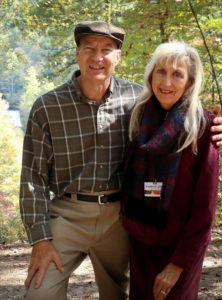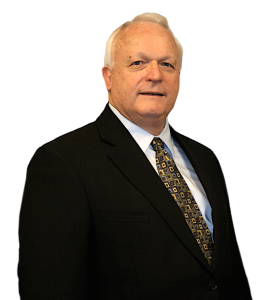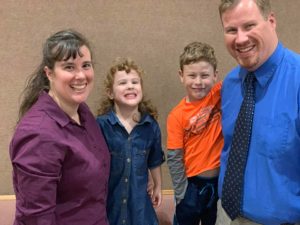Dates to Know
February 18 – You should receive the 2019 MFR Template with the new mileage rates.
March 1 – January Financial Reports will be due.
June 17-20 – Family Fellowship Week in Edinburg, VA.
New Employee!
 We are pleased to introduce Brittany Morrow as our new office assistant. Brittany’s initial tasks will include processing support checks. You can reach her by email at [email protected]. Her testimony is below.
We are pleased to introduce Brittany Morrow as our new office assistant. Brittany’s initial tasks will include processing support checks. You can reach her by email at [email protected]. Her testimony is below.
My name is Brittany Morrow. My testimony of salvation starts when I was a young girl at VBS. One particular night of VBS I decided to go to an altar call; all my friends were going and I didn’t want to feel left out. I clung to a repeat-after-me prayer I said that night as my testimony of salvation. As I grew older I struggled with my “salvation experience.” I was under conviction and I knew I was missing something in my heart. On April 2, 2008, at a revival meeting, I gave my heart and life to Christ. Although I had grown up in church all my life it wasn’t until I got saved that I began to understand the love of Christ and what He could do with my life.
Fast-forward to 2014, I met Justin whom I married on July 9, 2016. At this time I moved to Kings Mountain and started attending Faith Baptist Church in Shelby. In October of 2016, God called Justin to preach. The Lord has given my husband opportunities to preach since then and has opened many doors for us to serve in. Together we serve in our church’s bus ministry where we both share a route and teach classes. We also serve as sponsors to our youth group. As sponsors, we help with the SIGMA youth program and attend youth meetings and trips. I’m thankful for the ministries the Lord has allowed me to be involved in and can’t wait to see what He has in store for my spiritual journey.
Retirement Accounts
Last year, our CPA and attorneys identified a tax advantage for you by having us begin to issue a 1099 tax document instead of a W-2 for all of our missionaries. These tax professionals recommended to the Executive Board to make the transition. The pastors on the Executive Board voted to make this change effective 2019.
One of the advantages of receiving a 1099 tax document is you have greater choices for types of retirement accounts. You now have available to you and/or your spouse these additional Individual Retirement Accounts (IRA) options:
1. Traditional IRA
2. Roth IRA
3. SEP-IRA
4. SIMPLE IRA
5. Solo 401(k)
You are also able to open an account with any investment firm of your choice.
Click here to read an article I found helpful in understanding the benefits of each account.
Another helpful article from Dave Ramsey is available by clicking here.
You may want to speak with someone about your retirement options. David O’Malley, Bro. O’Malley’s brother, is an advisor for Edward Jones. He has offered to assist our missionaries in any way, even if they are not a client of his. His offer is a no-cost unbiased consultation. His phone number is 561-833-9123.
Most investment firms offer the above IRA options to independent contractors. (Independent Contractor is the term the IRS uses to describe your relationship to WW as a self-employed missionary.) You will need to discuss your options with the firm. The investment firm will have specific instructions for you once you make the choice of what type of account you want. When you have opened your account, you can contact me and I will be happy to send your monthly contribution in for you.
Speaking with an investment advisor and/or your CPA can help you in choosing the best plan for you and your family. There are more options available to you than ever before. Please do not delay. Adding retirement investing to your monthly budget means preparing for your family’s future.
If you have any questions, I will be happy to assist in any way.
Mrs. Kim O’Malley
Benefits of Financial Reports
The Monthly Financial Report (MFR) is the tool that missionaries can use to become accountable to WWNTBM for their reimbursable expenses, rather than having all funds listed as salary. Over the course of 2018, 79% of those eligible chose to submit MFRs. By doing so, they were able to reduce their W-2 Wages by a combined average of 31.11%. If you are not currently utilizing MFRs and would like information about how to begin, please contact our Office. We also recommend watching the MFR Intro video. This is available in SecureCloud under Forms and Manuals.
Financial Status Report
We have uploaded a Financial Status Report to your SecureCloud account, showing figures for the fourth quarter of 2018. This is meant to show you the financial details that we have on file, such as your support estimate and the average amount of support you received this past quarter. This is information we provide to pastors who may call about your ministry. We ask that all missionaries update their support estimate once every four years or as your lives and ministries change. Please review this information and contact us if you have any questions.
Uplift Schedule
Each month World Wide holds encouragement conference calls for our missionaries. This year we broadened the times of these meetings to give more of our mission family the opportunity to join. Friday meetings at 11:15 AM EST will remain deputation focused. The other dates and times we arranged for the convenience of those in our mission family serving in varying time zones.
1st Tuesday of the Month: 6:00 AM EST
2nd Tuesday of the Month: 9:00 AM EST
3rd Thursday of the Month: 11:00 AM EST
4th Tuesday of the Month: 9:00 PM EST
Each week we send you an email to let you know about the meeting opportunities for the week and how to join. The current schedule is listed below. All are welcome to join any Uplift meeting!
February 8 – 11:15 AM EST – Jeremy Lockhart – Deputation Challenge
February 12 – 9:00 AM EST – Markie Bullock – Spiritual Encouragement
February 15 – 11:15 AM EST – John O’Malley – Character Building
February 21 – 11:00 AM EST – TBA
February 22 – 11:15 AM EST – Leland Johnson – Cold Calling on Deputation
February 26 – 9:00 PM EST – Mike Grove – Spiritual Encouragement
March 1 – 11:15 AM EST – David Landers – Spiritual Encouragement
Please contact us with any questions.
New Baby!
 Elijah “Judson” Brown was born to Matt and Nikki Brown on January 30. He weighed 6 pounds 14 ounces and was 20.5 inches long. The Browns are on furlough and will soon be returning to Cambodia. They have three older children: Joshua (5), Julie (3), and Judah (2).
Elijah “Judson” Brown was born to Matt and Nikki Brown on January 30. He weighed 6 pounds 14 ounces and was 20.5 inches long. The Browns are on furlough and will soon be returning to Cambodia. They have three older children: Joshua (5), Julie (3), and Judah (2).
New Missionaries!
Don and Karen Clarke are the newest missionaries to partner with World Wide. They  are sent out of Emmanuel Baptist Church in Kings Mountain, NC, with Pastor Jim Ogle. The Clarkes previously served as missionaries in Kenya for 15 years. They have seven adult children, including Gloria Duarte, who is our missionary to Brazil. They desire to serve in a helps ministry, including furlough replacement.
are sent out of Emmanuel Baptist Church in Kings Mountain, NC, with Pastor Jim Ogle. The Clarkes previously served as missionaries in Kenya for 15 years. They have seven adult children, including Gloria Duarte, who is our missionary to Brazil. They desire to serve in a helps ministry, including furlough replacement.








